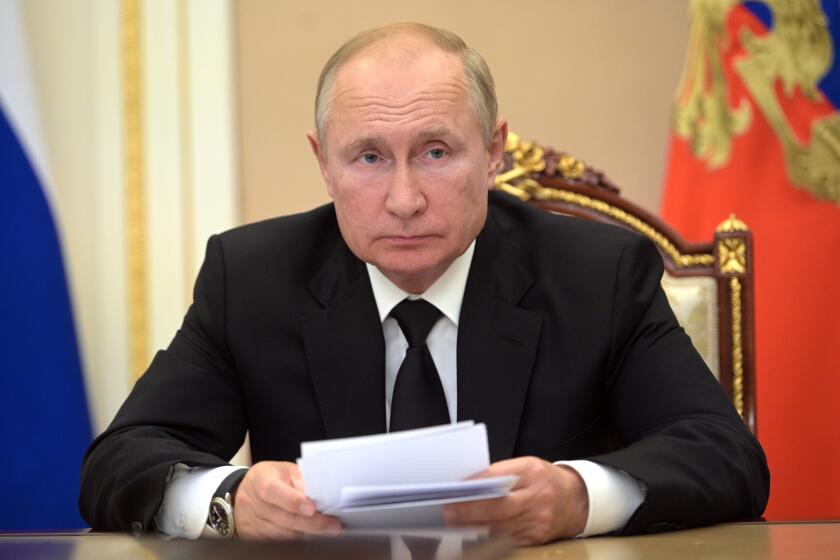Commentary: It’s not easy to boycott companies that keep operating in Russia. But it’s the right thing to do

- Share via
I rifled through my pantry this week hunting for Georgia-Pacific products such as Brawny paper towels or Angel Soft toilet paper.
Relief, though it would be short-lived. There were none.
Pulp and paper company Georgia-Pacific is a subsidiary of Koch Industries, which has refused to cut back its operations in Russia. I’m willing to take some consumer action to make life uncomfortable for that company and the renegade country in which it continues to operate.
In general, boycotts are overdone. I‘m not a fan of the California state government’s boycott of states that pass laws discriminating against transgender people, even though those laws are grossly ignorant.
The best boycott is targeted, well-informed and consistent — such as the 1960s boycott of California grapes — and thus more likely to result in change. Instead, boycotts, which should be rarely used, have become diffuse and common.
These companies are staying the course in Russia, to their discredit.
But there are exceptions when we have to pull out the stops as shoppers to effect change. Russia’s assault on Ukraine fits the bill. The vicious attack on a sovereign nation and the deliberate killing of civilians, including young children, flout every rule of civilized nationhood. The megalomania of Vladimir Putin, a man who apparently considers himself above the rules of international law, is a horrific threat not just to Ukraine but democratic nations far beyond its borders.
As a Jewish woman with relatives who were Holocaust survivors, I am leery of facile comparisons to Nazism. But if anything reminds me of Hitler’s casual embrace of deadly cruelty toward the innocent, this is it. On one side of my family, both my father and my biological father — that’s a story for another day — were of Ukrainian heritage.
It’s an uneasy heritage; my grandmother and her sisters fled Ukraine in 1915, much like Ukrainians are doing today but not to evade foreign invaders. It was because of a pogrom carried out by the Ukrainians that killed many of the Jews in their village.
By the strange evolution of the world, Germany is now a progressive ally and Ukraine is led by a young Jewish man. What matters right now is that I do what I can to stand against evil where and when it is found today.
Not everyone can afford to donate to organizations that aid Ukraine and its people. But most people can afford to change some of their buying habits to support companies that are doing the right thing by withdrawing their business from Russia and to send a message to the others that there’s a price to be paid. The more we squeeze the Russian economy, the more we erode Putin’s base of power.
We applaud companies, government leaders and individuals seeking ways to use their dollars to show solidarity with Ukraine — even if they are sometimes more symbolic than substantive.
This is not as simple as avoiding Russian vodka, which is a tiny percentage of the vodka sold in the U.S. Dozens of companies do business, or recently have done business, in Russia, maintaining factories, providing transportation or selling goods. A Yale professor of management, Jeffrey Sonnenfeld, has made the exercise somewhat easier by compiling a list that sorts companies into five categories, ranging from those that have cut off all operations in Russia to those that insist on doing business as usual.
But it’s still complicated. How do you effectively boycott giant multinational corporations that have absorbed other companies? The consumer brands in our homes are usually manufactured by a parent company with another name — such as the Brawny paper towels and Dixie cups made by Koch Industries.
If I follow Sonnenfeld’s list, it’s still OK to make purchases through EBay and Amazon, because the former has pulled out of Russia and the latter has suspended operations (though some people may have different reasons for boycotting the giant online retailer), but it’s time to change my house cleaning liquid. I can in good conscience keep my retirement account where it is, but I’ll have to switch my pasta.
My Bounty paper towels and Charmin toilet paper aren’t a product of Koch, which is at the shameful bottom of Sonnenfeld’s list. But they’re made by Procter & Gamble, which is just one notch up, listed as not putting new investments into Russia for the time being. That’s not good enough for me.
In the month since Russia invaded Ukraine, public pressure has prompted many companies to close, suspend or otherwise cut back on operations in Russia — a sign that boycotts could work. So the list, which is frequently updated, needs repeat checking as well.
Boycotting all of the companies that still do business with Russia is probably unworkable. But taking at least some action seems like a small task compared with carrying a child and whatever valuables one could manage to haul in the flight to safety, as my grandmother and her sisters did.
I won’t boycott agricultural companies that sell seeds for growing food or pharmaceutical companies that provide necessary medications. I want to encourage Russian resistance to Putin‘s war, not make sick people suffer or contribute to food shortages in Russia or in the nations to which it sells wheat or other foodstuffs.
My suggestion if you want to avoid Russia-involved companies: Pick just one or a few companies and see what products they make. Find a replacement from a more responsible company or one that hasn’t had Russian operations. Who knows, we might just discover some small, independent companies that are making superior products and could use a boost.
Write to the offending company and let it know what you’re doing and why. While you’re at it, you might want to write a couple of appreciative notes to the companies that have pulled out of Russia.
A boycott may hurt some innocent people. Workers who thoroughly despise Putin and his actions could lose their jobs if companies pull out of Russia. We have to decide if exerting pressure to stop the horror in Ukraine is worth this cost. To me, it is.
More to Read
A cure for the common opinion
Get thought-provoking perspectives with our weekly newsletter.
You may occasionally receive promotional content from the Los Angeles Times.













